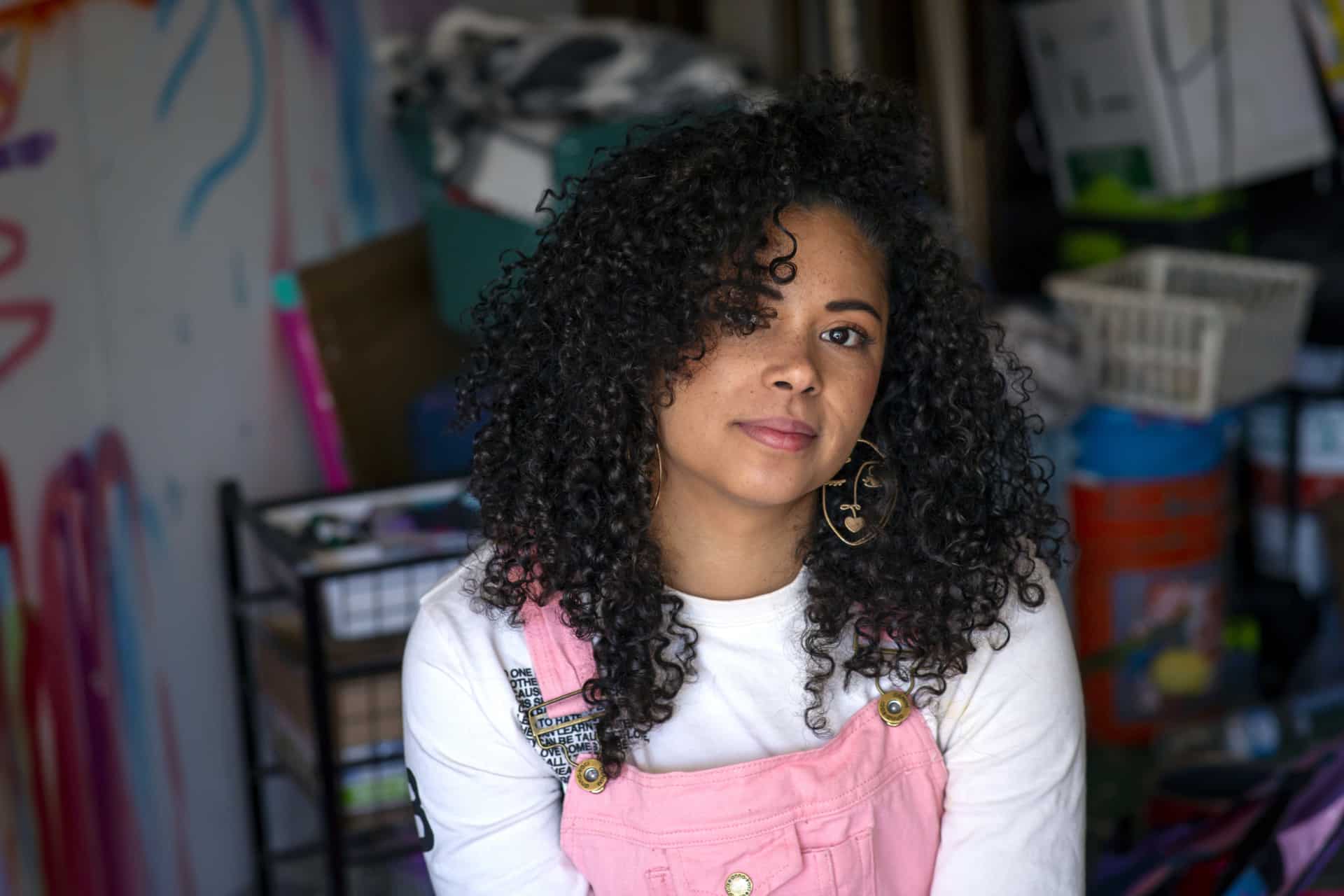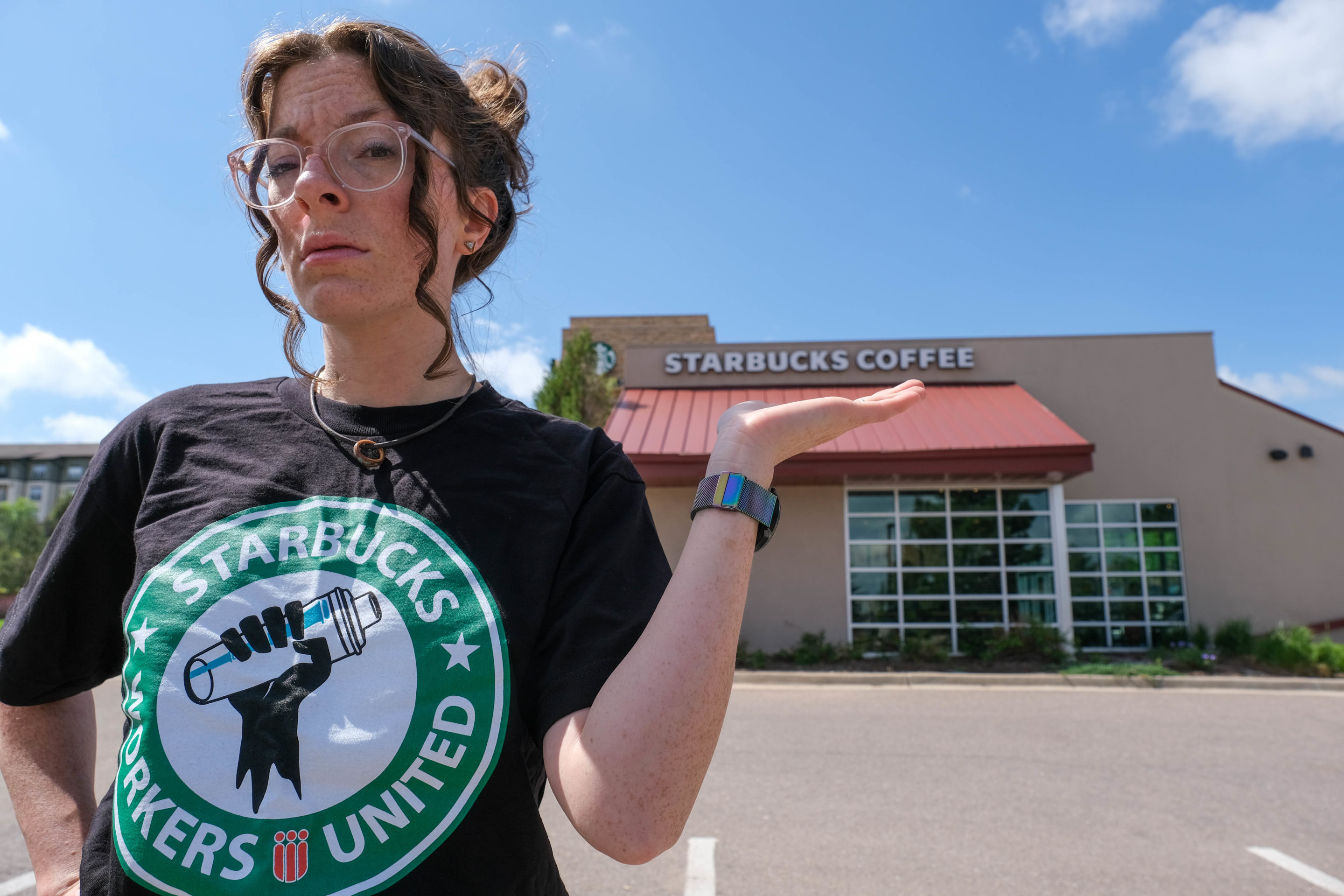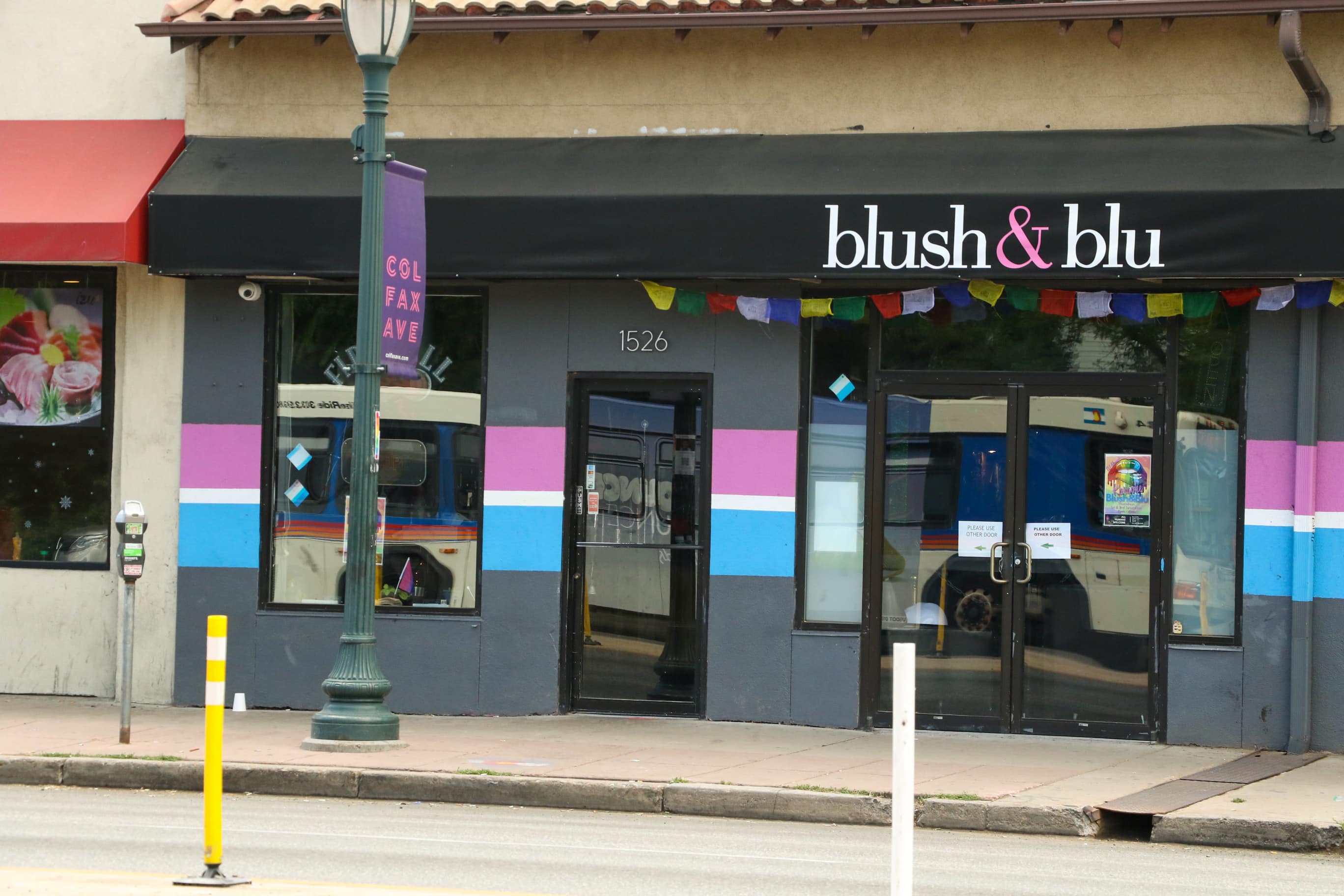//Moe Gram, Denver-based artist, educator and public speaker, sits in her home studio in Denver on Jan. 11. Gram’s work is a blend of her passion for social justice and art. Photo by Polina Saran | [email protected]
When Denver artist Moe Gram was growing up, she wanted to be a biochemist.
“It sounded fancy to me at the time, I was like, ‘I want to be a biochemist.’ And it was like, girl, no, you don’t,” Gram said.
At the same time, she had a Bob Ross paint by numbers kit. She would sit in her walk-in closet, drawing and painting for hours on end. After she put the finishing touches on each piece, she hung them on the walls of her closet.
“I think I was always an artist, but I didn’t know it,” she said. “And I just thought art was a hobby. You know, I don’t think I really knew that I wanted to be an artist.”
While Gram didn’t realize her artistic potential until college, she has more than made up for time lost. Denverites have almost certainly seen her vibrant, pop-y murals around the city. She’s had installations at the No Place to Go haunted house, Meow Wolf’s Dark Palace music festival, the Museum of Contemporary Art Denver and the Biennial of the Americas. She is as prolific an artist as that little girl could only dream. And after reflecting on her past, Gram has now launched her most ambitious project to date.
Gram was born in Fontana, California and raised in Bakersfield. Her parents had her when they were 15-years-old, making her the “product of what happens in the back of an El Camino when you’re supposed to be at [winter] formal.” Her mother is Black and her father is Filipino and white. She graduated from California State University Bakersfield with a major in studio art and a minor in cultural studies. During her time at university, she studied abroad in Florence, Italy, where she realized art was her passion.
“I was actually a kinesiology major before I became a visual arts major, if you could believe it,” Gram said. “I took one anatomy class and decided—that fucking sucks. It’s math and chemistry and body parts fixed together. I was like, ‘that is not for me.’ So then I became an art major and studied abroad. And that was the point that my happily ever after started.”
After graduation, Gram worked as a manager at a Bakersfield Hollister. She felt stuck working what felt like a dead-end job, struggling to get a toehold in the California art scene. A friend called her and suggested moving to Denver. She already had connections in Colorado and knew that her other two options, Los Angeles or San Francisco, were way too competitive for an up-and-coming artist.
“I just thought like, hell yeah, people would not judge me for my Birkenstocks in Denver!” she said. “And so, me, my socks and my Birkenstocks made it all the way to Denver. It was really an opportunity to think about becoming an artist.”
Seven years later, Gram has become one of the most recognizable Denver artists. And she’s passing along that talent and knowledge to future generations. Gram currently works as an art educator at Strive Prep’s Green Valley Ranch campus. Over the past two and a half years, she’s built a full, “culturally responsive” art program for 6th-8th graders. The classwork urges students to explore the key parts of their identities and how they interact with their community. She’s currently developing the curriculum to extend through 12th grade.
Gram says the engagement from her students astounds her. The actual, funny story, Gram said, is her walking in thinking her students needed her when the reality is they challenge and teach her every day.
“It’s so crazy because it just really goes to show that when you believe in children and you believe in their voice, and you give them an opportunity to express themselves, these kids are freaking phenomenal,” Gram said. “They’re amazing.”
And now Gram is moving on to even bigger things.
On March 17, Gram officially announced her Every Human empathy campaign, a five-year project that will utilize art to spread messages of empathy and consideration. The project evolved from her 2019 exhibition “Every Human” at Understudy Denver in partnership with the Biennial of the Americas. The installation examined the common denominator between individuals in order to push against biases and shallow empathy. The artist thought long and hard about what every single human has in common. She finally settled on one universal experience: Every human poops.
The interactive “Every Human” installation encouraged participants to literally put their noses against brightly painted sectional walls and reflect on their actions. The request is reminiscent of those made by kindergarten teachers putting their students in time out. The ultimate lesson, according to Gram, is humans must be accountable for their actions.
“Don’t be a dick, you know, don’t be rude,” Gram said. “Be mindful of how your words and your actions impact people.”
Gram carried this concept over to the international campaign of the same name. She hopes to partner with artists and businesses to create projects that “encourage humans to be reunited with their humanity.” She hopes to inspire collaborations on everything from plays, docuseries, apparel lines, festivals, public art and everything in between.
“I know what it feels like to have a lot of feelings, but not also be heard and to not have people take the time to really empathize,” Gram said. “I think I was born and put on this earth to make sure that people feel loved and seen and valued and cared for.”
At the center of the project is her often-used phrase, “Empathize with you and them.” Gram said the first step to empathizing with another person’s life experiences is unpacking individual traumas and insecurities. Showing up to a conversation without having done any personal work makes it difficult to know where the other person is coming from.
“If you don’t forgive yourself and you don’t empathize with your own circumstances, then you can’t get past that point,” Gram said. “You’re going to show up defensive and you’re going to show up feeling like you have something to prove.”
Gram wants to have uncomfortable conversations with those who are open to them. The last thing she wants to do is shame someone into silence, especially if they’re willing to listen. She has a problem with keyboard warriors who immediately shout others down over missteps. According to her philosophy, they have yet to unpack their own trauma and therefore take it out on others. Oftentimes this type of shaming backfires, Gram said, and those who were in the wrong end up digging in their heels.
“And now they’re too ashamed to even try again,” Gram said. “It’s like children, right? If a kid falls off of their bike, the first time they’ve ever ridden a bike and you’re like, ‘Oh, you suck, how dare you,’ that kid’s not going to want to ride that bike again.”
The artist has no delusions about this project. She knows the likelihood of every person uniting to be one big, happy family is slim. She knows people will continue to be mad and yell in each other’s faces. But, she said, if people aren’t given the space to unlearn their behavior, it’s a disservice to society as a whole.
“We won’t all be united, but there are people out there who do not feel seen, but when they do feel seen, they’ll join us in the party.”
Video below by Polina Saran. Interview by Madison Lauterbach.
Enjoyed this video? Help us keep the lights on! Supporting local press ensures the stories you want to read keep coming, become a member for free today! Click here.





0 Comments